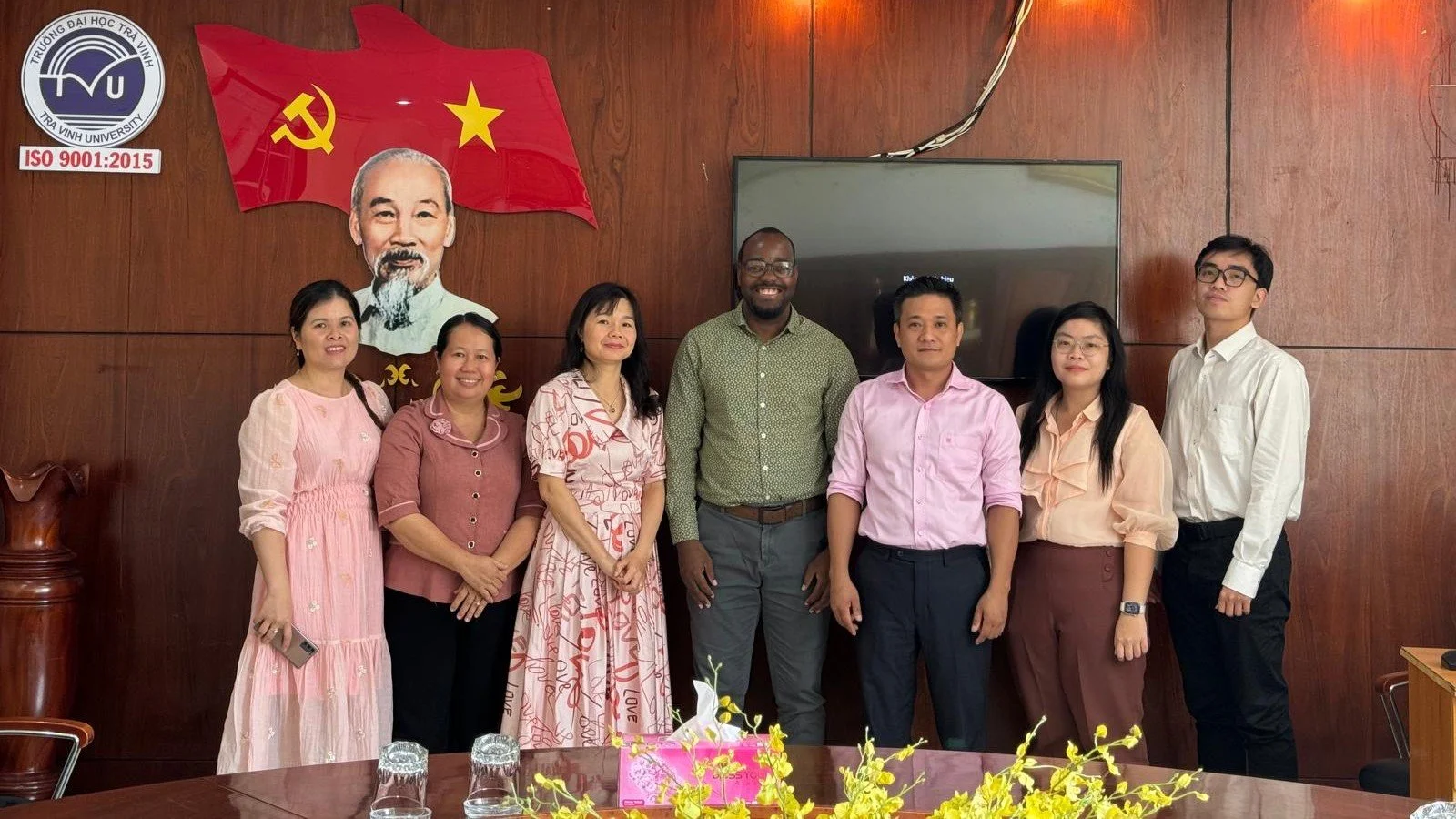The team at Tra Vinh University (TVU) provide an update of their exciting project, a first-of-its-kind initiative to close the aquatic animal welfare (AAW) gap in Vietnam’s education system. This project is part of an international collaboration involving the Shrimp Welfare Project (SWP) (UK), Aquaglobal Veterinary Consulting (AVC) (South Africa), and the local partner, Chau Phi Fisheries Joint Stock Company. Project partners have been instrumental in project design, offering support in facilitating the project, providing practical insights, and contributing expertise in aquatic animal welfare. This project aims to raise awareness of aquatic animal welfare (AAW) and pave the way for making it a key part of the country’s education system. As AAW becomes increasingly important in global aquaculture, this project highlights Vietnam's positive stance and commitment to advancing education in this crucial area.
Short video introducing the project
The four key components driving this project includes a perception study to gauge awareness and attitudes towards aquatic animal welfare; a curriculum benchmarking assessment (using TVU as a case study) to assess how AAW is taught; a short study on university students to evaluate educational impact; and a workshop designed to review project outcomes and draft an action plan on closing the AAW education gap in Vietnam.
The perception study engaged 10 Vietnamese academic institutions located in south and south-central Vietnam (see map) where 359 students and 47 educators participated in the survey.
Map outlining the 10 tertiary institutions in south and south-central Vietnam that participated in the aquatic animal welfare perception survey
Additionally, 34 industry stakeholders participated in the survey providing diverse perspectives from sectors such as aquatic medicine, seed production, grow out, seafood processing, feed and nutritional supplement production, research, and fisheries management.
Tertiary institution educators completing the pilot perception survey on aquatic animal welfare
Students at Tra Vinh University completing the student perception survey on aquatic animal welfare
The study explored various factors influencing perceptions of AAW such as gender, age, religion, nationality, socioeconomic status, Vietnamese culture, seafood consumption, level of education, educational background, and student future job prospects.
Encouragingly, 79.67% of students expressed a desire to see aquatic animal welfare integrated into their curriculum. Key areas for improvement identified by students included viz. expanding practical training, providing more detailed content on AAW, and fostering broader inclusion across educational programs. Students also advocated for more stakeholder partnerships and collaborations, alongside a call for more research and innovation, internships, seminars, and workshops in AAW.
Feedback expressed from industry stakeholders highlighted the need for more graduates to add value in welfare research, policy and legislation development, industry practices, public awareness and advocacy, conservation, and aquaculture. The willingness of 88.24% of industry stakeholders to support tertiary institutions to improve AAW education for their learners, instils confidence that a considerable positive impact can be made in the education system in Vietnam concerning AAW.
In August 2024, a comprehensive assessment of TVU's curriculum was conducted, focusing on 38 metrics, including curriculum content and delivery, industry and regulatory collaboration, educator and instructional information, student engagement and performance, assessment and evaluation, data analysis and reporting, and mechanisms for continuous improvement. A detailed evaluation of the curriculum’s theoretical and practical components was also completed, and a local benchmark partner is currently undergoing its own curriculum assessment to provide additional insights. This tool proved effective in identifying gaps at TVU, can be used by other institutions as well. By applying this tool, other universities can similarly assess and address gaps in their own curriculum structures, leading to more effective and comprehensive welfare education across the board.
Meeting held at Tra Vinh University to discuss application of the curriculum benchmark assessment on the curriculum taught at the university
As the project progresses, preparations for a study on university students to assess the educational impact are underway, with a short pilot study planned before the full study begins. The study will involve two groups of students, with one group receiving educational content on aquatic animal welfare via a video, followed by an online test on aquaculture welfare harvest issues.
Literature and policy research
Next month (October 2024), TVU will host a pivotal workshop, bringing together educators and stakeholders to discuss the outcomes of the project so far and explore strategies for enhancing aquatic animal welfare education in Vietnam. This collaborative effort will serve as a blueprint for future educational reforms in the field, ensuring that aquatic animal welfare remains a key focus in Vietnam’s academic landscape.
By taking the lead in addressing this vital issue, TVU is not only enriching its own curriculum but also laying the groundwork for a more sustainable and welfare-conscious future in Vietnamese aquaculture.
This project offers a unique chance to collaborate with local and international educational institutions to integrate aquatic animal welfare into academic programs. By doing so, it ensures that students and professionals receive appropriate training in ethical practices and humane handling techniques. Beyond education, the project will enhance capacity building and knowledge transfer through workshops, training, and partnerships with international experts, helping the aquaculture industry improve welfare practices across the board. Additionally, it will support changes to Vietnam’s national policies, aligning them with international welfare standards to foster better practices throughout the sector.








